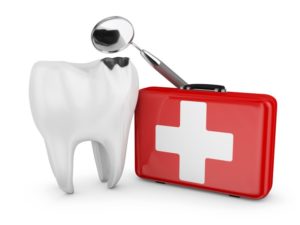4 Dental Emergency FAQs with Your Emergency Dentist in Jacksonville
March 29, 2019

One minute, life is going along smoothly—the next, you suddenly have a dental emergency! If you don’t know what to do, you can quickly become overwhelmed and stressed, potentially causing you to lose valuable time. In fact, how fast you get necessary treatment could mean the difference between saving a tooth or not. The best way to make sure your treatment is successful is to prepare now before a dental emergency happens. Here are helpful answers to four common questions about dental emergencies from your emergency dentist in Jacksonville.
What qualifies as a dental emergency?
A dental emergency is a situation that typically involves pain, potential bleeding, and damage to your teeth or gums. Some examples of dental emergencies include the following:
- Knocked-out tooth.
- Partially dislodged tooth.
- Toothache.
- Swelling in your mouth or face.
- Abscess, or an infected sore in the gums.
- Chipped, cracked, or fractured tooth.
- Lost or damaged dental work.
- Object stuck between teeth.
Should I go to the emergency room or the dentist’s office?
It can difficult in the moment to decide which resource you should turn to in an emergency situation. You want to get the best care for your problem and, if possible, avoid any unnecessary costs. Your dentist in Jacksonville is an expert in orofacial structures and dental care and can handle most dental emergencies. However, if you experience broken bones or bleeding that doesn’t stop within 10 minutes, go to the emergency room before seeing the dentist.
How should I handle a dental emergency?
In many dental emergencies, time is precious and can determine how successful treatment will be. That’s why it’s so important to act quickly and wisely. In most cases, you need to contact your dentist right away, but what should you do in the meantime? Here are just some examples of how to respond during a dental emergency:
- In the event of a toothache or a cracked or fractured tooth, rinse your mouth with warm water to keep the area clean. Call your dentist for the next available appointment, and use cold compresses and over-the-counter medication to manage the pain, but avoid topical pain relievers.
- For a knocked-out or partially dislodged tooth, get to the dentist’s office as soon as you can. Avoid touching the root. After rinsing it with water, try placing the knocked-out tooth back into the socket, or store it in milk or warm water to keep it moist. Leave a partially dislodged tooth for the dentist to reposition.
- For an object stuck between your teeth, use dental floss to try to remove it. Don’t attempt to use sharp objects because they can damage the gums or scratch the tooth enamel.
If in doubt of what you should do, call your dentist office for guidance specific to your situation.
How can I prevent dental emergencies?
Although not all dental emergencies are preventable, most are. You can reduce your chances of experiencing these unpleasant and stressful situations by doing the following:
- Brush your teeth twice a day.
- Floss your teeth once a day.
- Visit your dentist twice a year for checkups and cleanings.
- Don’t use your teeth for tasks that are meant for tools, such as opening packages or opening bottles.
- Don’t chew on hard things such as ice, your fingernails, pencils, pen caps, and popcorn kernels.
- Wear a sports mouthguard, which your dentist can provide, when you play sports, particularly contact sports.
- Wear a night mouthguard, which your dentist can supply, if you grind or clench your teeth during sleep.
Dental emergencies often happen when you least expect them. Although you can’t plan when or how they will happen, you can be prepared for when one does. By understanding more about dental emergencies and deciding how you will respond, you can increase your chances of a successful, happy result—being restored to full oral health.
About the Author
With many years of dental experience, Dr. Sol Brotman is a Master with the Academy of General Dentistry and is one of few practitioners to pass the written examination for Board Certification in General Dentistry. In addition, the University of Maryland named their clinical and research facility The Brotman Center for Orofacial Pain. To schedule an appointment with him, you can call (904) 396-4091 or click here.
No Comments
No comments yet.
RSS feed for comments on this post.
Sorry, the comment form is closed at this time.
